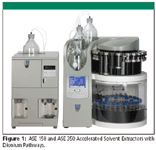Automated Extraction Technique for Improved Recovery of Phenols
The Application Notebook
Dionex has developed a new standard for flow-through solvent extraction which allows accelerated solvent extraction (ASE®) of matrices that have undergone acid or alkaline pretreatment or digestion. The new ASE 150 and ASE 350 systems use extraction cells and post-cell solvent pathways constructed of Dionium™ material. This pH-hardened substance resists corrosion under acidic or alkaline conditions used in standard pretreatments, widening the scope of ASE applications and significantly expanding its capabilities.
Dionex has developed a new standard for flow-through solvent extraction which allows accelerated solvent extraction (ASE® ) of matrices that have undergone acid or alkaline pretreatment or digestion. The new ASE 150 and ASE 350 systems use extraction cells and post-cell solvent pathways constructed of Dionium™ material. This pH-hardened substance resists corrosion under acidic or alkaline conditions used in standard pretreatments, widening the scope of ASE applications and significantly expanding its capabilities.
Typical recoveries of complex analytes such as substituted phenols from nonacidified samples often range from 15-50%. Acidic pretreatment of soils or tissues increases recoveries by protonating the phenolic groups and increasing their solubility in organic solvents.

Figure 1
ASE 350 Procedure for Extraction of Phenols from Soil
Soil samples were weighed (30 g) and each sample was placed into a glass beaker and mixed with 2 mL 10% HCl (v/v). The acidified samples were then mixed with 15 g ASE Prep DE™ and the entire mixture was transferred to a 66 mL Dionium extraction cell containing a glass-fiber filter. Samples were extracted using the ASE 350 with MeCl2/acetone (1:1) at 100 °C, with a five min cycle. The extracts were analyzed by GC–MS using analytical conditions outlined in EPA method 8270C. (1)
Results (Spiked Target: 40 μg/mL)
Conclusions
Preacidification of the soil samples followed by solvent extraction using the new ASE 350 increased the recoveries of substituted phenol compounds to a range of range of 50-85%—a significant improvement over analysis without pretreatment. The ASE, with its pH-hardened pathway, expands sample handling capablilites, making it an excellent option for improving recoveries of phenols from soil without affecting recoveries of polynuclear aromatics or other compounds.

Table I: Surrogate recoveries using ASE 350 with 10% HCl Pretreatment
References
(1) USEPA-SW846 V. 3 Test Method Manual
ASE is a registered trademark, and Dionium and ASE Prep DE are trademarks of Dionex Corporation.

Dionex Corporation
1228 Titan Way, P.O. Box 3603, Sunnyvale, CA 94088-3603
tel. (408) 737-0700, fax (408) 730-9403

Separation of Ultra-Short and Long Chain PFAS Compounds Using a Positive Charge Surface Column
December 11th 2024A separation of ultra-short and long chain PFAS (C1-C18) is performed on a HALO®PCS Phenyl-Hexyl column along with a HALO®PFAS Delay column which demonstrates excellent retention for both hydrophilic and hydrophobic analytes.

.png&w=3840&q=75)

.png&w=3840&q=75)



.png&w=3840&q=75)



.png&w=3840&q=75)













